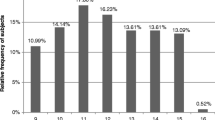Abstract
The interactional teaching strategies of mothers and fathers toward their sociometrically determined popular, moderately popular, or unpopular children, and children's responses to them were examined during a structured puzzle task in a laboratory setting. Parents of popular children used more explanations in aiding their children to complete the puzzle task than parents of moderately popular or unpopular children. Mothers were more likely to offer suggestions, use explanations, and ask questions during the puzzle task than fathers. Analysis of children's responses revealed that popular children were more likely to ignore imperatives by their parents compared with unpopular children, while unpopular children showed a tendency to be more cooperative following imperatives by parents than popular children. Finally, popular children were less likely to ignore but were more likely to go off task following suggestions by parents than either unpopular or moderately popular children. The data are discussed with respect to the possible link between parental socialization patterns and children's popularity in the peer group and the need to consider the interaction patterns in both the peer and parent-child systems for intervention purposes.
Similar content being viewed by others
References
Asher, S., Singleton, L., Tinsley, B., & Hymel, S. (1979). A reliable sociometric measure for preschool children.Developmental Psychology, 15, 443–444.
Baumrind, D. (1967). Child care practices anteceding three patterns of preschool behavior.Genetic Psychology Monographs, 75, 43–88.
Coie, J., Dodge, K., & Coppotelli, H. (1982). Dimensions and types of social status: A cross-age perspective.Developmental Psychology, 18, 557–570.
Cowen, E. L., Pederson, A., Babigian, H., Izzo, L. D., & Trost, M. A. (1973). Longterm follow-up of early detected vulnerable children.Journal of Consulting and Clinical Psychology, 41, 438–446.
Cowen, E. L., Zax, M., Izzo, L. D., & Trost, M. A. (1966). Prevention of emotional disorders in the school setting.Journal of Consulting Psychology, 30, 381–387.
Deutsch, F. (1974). Observational and sociometric measures of peer popularity and their relationships to egocentric communication in female preschoolers.Developmental Psychology, 10, 745–747.
Gold, M., & Petronio, R. J. (1980). Delinquent behavior in adolescence. In J. Adelson (Ed.),Handbook of adolescent psychology (pp. 495–535). New York: Wiley.
Gottman, J., Gonso, J., & Rasmussen, B. (1975). Social interaction, social competence, and friendship in children.Child Development, 46, 706–718.social interaction (pp. 185–206). Madison: University of Wisconsin Press.
Hartup, W. W. (1979). The two social worlds of childhood.American psychologist, 34, 944–950.
Hess, R. D., & Shipman, V. C. (1965). Early experience and socialization of cognitive modes in children.Child Development, 36, 869–886.
Ladd, G. (1983). Social networks of popular, average, and rejected children in school settings.Merrill-Palmer Quarterly, 29, 283–307.
Lamb, M. (1979). Parental influences and the father's role: A personal perspective.American Psychologist, 34, 983–943.
Leiberman, A. (1977). Preschooler's competence with a peer: Relations with attachment and peer experience.Child Development, 48, 1277–1287.
Loeber, R. (1982). The stability of antisocial and delinquent child behavior. A review.Child Development, 53, 1431–1446.
Lorion, R. P., Cowen, E. L., Kraus, R. M., & Milling, L. S. (1977). Family background characteristics and social adjustment problems.Journal of Community Psychology, 5, 142–148.
Peery, J. C., Jensen, L., & Adams, G. R. (in press). Relationship between parents' attitudes regarding child rearing and the sociometric status of their preschool children.Journal of Psychology.
Putallaz, M., & Gottman, J. (1981). An interactional model of children's entry into peer groups.Child Development, 52, 986–994.
Roff, M. (1961). Childhood interaction and adult conduct.Journal of Abnormal Social Psychology, 63, 333–337.
Rutter, M. (1975).Helping troubled children: London: Plenum Press.
Sackett, G. P. (1979). The lag sequential analysis of contingency and cyclicity in behavioral ineraction research. In J. Osofsky (Ed.),Handbook of infant development (pp. 623–649). New York: Wiley.
Spivack, G., Marcus, J., & Swift, M. (1986). Early classroom behaviors and later misconduct.Developmental Psychology, 22, 124–131.
Waters, G., Wippman, J., & Sroufe, A. L. (1979). Attachment, positive affect, and competence in the peer group: two studies in construct validation.Child Development, 50, 821–829.
Weiner, I. B. (1980). Psychopathology in adolescence. In J. Adelson (Ed.),Handbook of adolescent psychology (pp. 447–471). New York: Wiley.
Westman, J. C., Rice, D. L., & Bermann, E. (1967). Relationship between nursery school behavior and later school adjustment.American Journal of Orthopsychiatry, 37, 725–731.
Winder, C., & Rau, L. (1962). Parental attitudes associated with social deviance in preadolescent boys.Journal of Abnormal and Social Psychology, 64, 418–424.
Zax, M., Cowen, E. L., & Rappaport, J. (1968). Follow-up study of children identified early as emotionally disturbed.Journal of Consulting and Clinical Psychology, 32, 369–374.
Author information
Authors and Affiliations
Additional information
Portions of this paper were presented by the first author at the Banff International Conference on Behavioral Science, Banff, Alberta, Canada, 1984. The research was supported through the Western Regional Project W144, Development of Social Competencies in Children, with funding from Science and Education Administration/Cooperative Research of the USDA and Utah State University Agricultural Experiment Station. We would like to thank the parents and children for their participation, and Nina Mounts, Maria Norton, Carla Seamons, Soheila Sobhani, and Joan Wareham for their assistance with varying aspects of coding and data analysis.
Rights and permissions
About this article
Cite this article
Roopnarine, J.L., Adams, G.R. The interactional teaching patterns of mothers and fathers with their popular, moderately popular, or unpopular children. J Abnorm Child Psychol 15, 125–136 (1987). https://doi.org/10.1007/BF00916470
Revised:
Issue Date:
DOI: https://doi.org/10.1007/BF00916470




